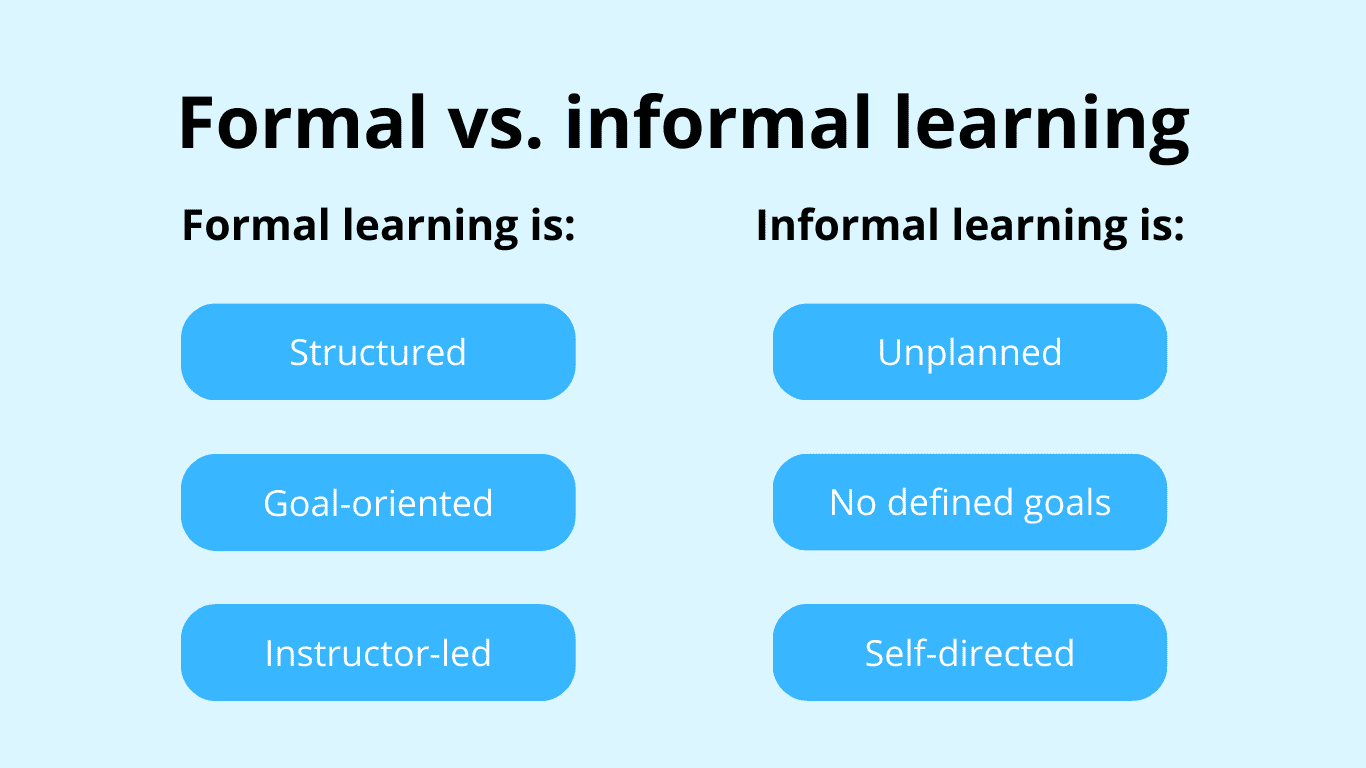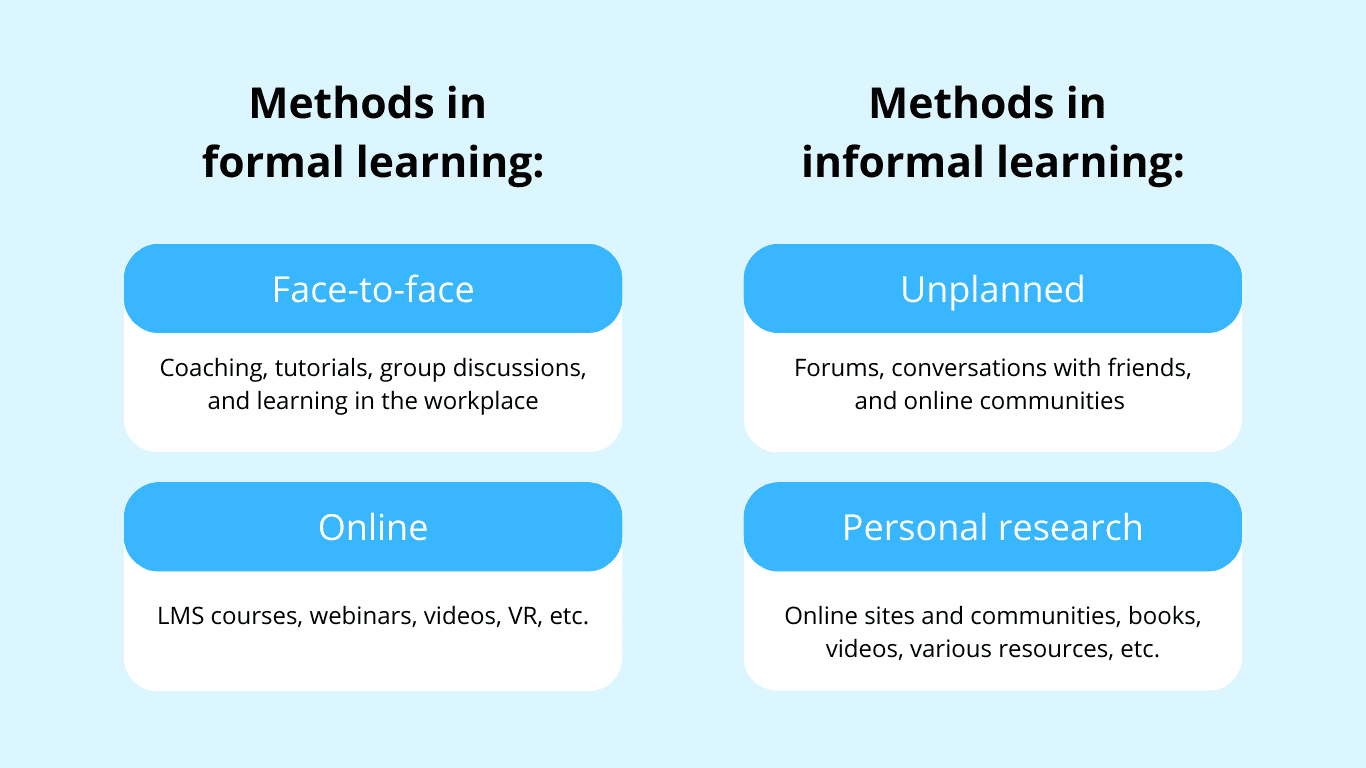Informal learning happens naturally and without you knowing it, either from observing someone complete a task or watching a video online. These are small learnings that can be utilised in your job and help close the skills gap that exists between your competencies and the job requirements. They are also methods that will help you continue to learn outside of the workplace and realise the goal that many employers have, which is for learning to be a lifelong process.
What is informal learning?
Informal learning is a type of learning that happens automatically and when people are not even aware that they are learning. You can say that informal learning is incidental and happens casually in daily life. Oftentimes, informal learning happens at your workplace when you observe colleagues or are reading articles that are relevant to your position.
Examples of informal training
As an adult, when you are out of school, learning becomes something that happens either at your job or in your personal life. Learning, or training, is something that will happen naturally or in a more structured manner in your workplace, when you hang out with your friends, or when you spend time delving into your interests. Informal learning covers all the learning experiences that occur sporadically and without a determined goal connected to it. Explore some examples of informal training below.
Example 1: Experience from your job
The workplace can facilitate informal learning by encouraging knowledge-sharing and creating forums where co-workers can learn from each other. However, it is up to the individual whether to take advantage of this and actually learn. The workplace can also curate content that the employee chooses to delve into and help them improve in their position.
Example 2: Reading and self-studying
Oftentimes, informal learning occurs when you are reading magazines or books, and even watching YouTube videos and are delving deeper into an issue you are interested in. If you work in a marketing agency, you can choose to watch experts explain successful marketing strategies. But it can also happen more organically, when you read fictional literature and the main character’s interests align with your personal hobbies.
Example 3: Online communities of learning
Online communities, whether educational or social, are great sources of information where people can stumble upon new knowledge that will benefit them in another situation.

You learn informally when a co-worker guides you through a task.
Informal learning is social learning
Informal learning has a flexible nature, where people can learn on their own terms, based on their own goals and needs. If you have a preferred learning method, like blended or bite-sized learning, you can take full advantage of this. You are not dependent on being in the workplace or in school, all you need is to surround yourself with people or search for information organically in books, magazines, videos, or online forums.
Spot informal learning
We have made a list of characteristics to informal learning:
- It is a less planned and more incidental form of learning.
- The methods are often verbal, like mentoring, discussions or instructional.
- It consists of ad hoc training sessions where the employees demonstrate skills and share them with their team members.
The difference between formal and informal learning
The main difference between formal and informal learning becomes visible in the methods that are being used. These are shaped by the structure of the learning process, where as you can imagine, this is unplanned, self-directed and not specifically goal-oriented in informal learning methods. Casual conversations and online resources shape the learning outcome through informal learning, while coaching, tutorials and webinars guide employees in formal learning techniques.
What is formal learning?
Formal learning is offered through structured and planned learning methods and forums. When you are employed, it is natural to develop in your position and many workplaces facilitate courses for upskilling to bridge a skills gap in the company. Oftentimes it is based on a learning and development strategy that is set forth by your workplace.
Formal learning examples
Courses through a learning management system (LMS) or course providers is a great example of formal learning. The company uses a LMS to achieve internal upskilling, where they take advantage of either online or traditional courses that delve into a specific topic or area. There is an instructor, there are defined goals and there are materials accessible for you to achieve these goals.
Advantages and disadvantages of informal learning and training
Informal learning is a reflective practice and way of doing training proactively and practically. Therefore, one of the biggest benefits to informal learning is the accessibility and hands-on nature of it. This feeds into the goal of continuous learning being a lifelong process, which many companies wish for their employees, both in terms of personal development and in terms of professional performance.
List of advantages
- Effective learning outcome: It is natural learning which produces effective and enriching learning outcomes, which are reinforced naturally.
- Learn on their own terms: By driving the learning on their own, employees increase their autonomy and can personalise the learning with their preferred methods.
- High probability of high engagement: Self-driven learning is powered by their motivation and their desire to improve.
List of disadvantages
- Not conducive to a specific task: Less effective when it is a specific knowledge or skill that the employee wants to gain.
- Not measurable: You can not measure the success of an informal training programme, because there is no LMS platform or course roadmap with defined KPIs linked to the learning.
- Dependant on the individual: You cannot demand that the employee uses the informal tools accessible to one or that they can implement what they learn without knowing it to specific tasks in the workplace.
Explore the FrontCore learning platform
In FrontCore we offer systems for training management and learning management. You can use our learning management system (LMS) to simplify formal learning and draw on skills and knowledge that your employees have learned informally. This is a tool you can use for in-house training, which allows you to build online courses that can be organised however you like.
Informal learning has a huge impact on formal training
There is a direct correlation between informal learning methods and the output of a learning and development strategy. It influences the performance and other indicators for success in the company, in addition to having an impact on how well the workplace can organise courses and training programmes to close the skills gaps in the company.
Be better equipped in the workplace
You can easily go from informal to formal learning, and use the knowledge and skills you obtain informally as a foundation for further upskilling and even more specialised knowledge in a formal learning environment. For example, when you have gained insight into how a specific task or software works, by observing a colleague do it, you can easily sign up to a course where you get to delve further into it and have a professional instructor guide you through it.
Support for performance and skills development
If you learn skills and gain pleasure in tasks in an informal environment, you can use this to get a better understanding of necessary skills at your workplace and develop these easier and more intuitively in a formal learning environment. You will experience learning as something motivating in itself, because you learn on your own terms, which you can use to keep engaged in training courses that are organised by your employer.
Did you like this article? Don't forget to share it:








0 Comments